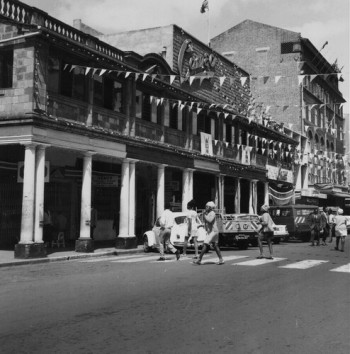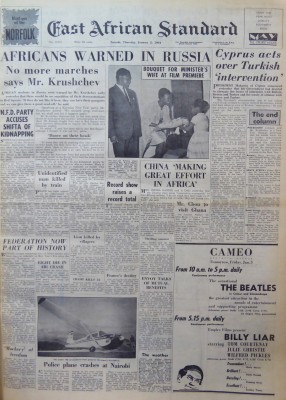
Another World? East Africa and the Global 1960s seeks to understand and explain how East Africa’s global connections systematically broke down after independence, opening up a set of new and unpredictable paths forward.
The project is funded by the Leverhulme Trust and will run from 1 January 2019 to 31 December 2022.
The global turn has privileged long-term flows of people, capital and ideas, assuming the ubiquity and ever-increasing power of these connections. But the view from early postcolonial East Africa challenges this narrative. East Africa’s global connections were powerful and real at independence. But by the early 1970s, utopian ideas of a globally connected African future had been destroyed by introverted nationalism.
This project interrogates key assumptions of the linearity of globalisation by exploring how a vision of a connected postcolonial world shattered. It does so through a focus on ideas, traced through print and written correspondence.
Print and written correspondence were crucial vehicles for global thinking in East Africa. They were vehicles of connection, through which links were forged and connections imagined, and of disconnection, in which incommensurable difference was asserted and connections ruptured.
To trace competing visions of East Africa’s future, we will combine close reading of printed texts such as newspapers (e.g. Baraza, a Swahili-language newspaper published in Nairobi), literary journals and periodicals (e.g. Transition, founded in Uganda in 1961 and read widely across East Africa until its editor Rajat Neogy was arrested and imprisoned by Uganda’s first Prime Minister, Milton Obote, in 1968), trade union and party pamphlets, novels and poetry, published in vernacular languages as well as Swahili and English, with the written correspondence held in archival repositories through which a ‘commonwealth of letters’ was created.

Our objectives are:
- To broaden our understanding of how East Africans imagined the world and their place in it by excavating networks of global affinity between authors and readers spread across the world.
- To assess the implications of the implosion of cosmopolitan, internationalized utopian visions of Africa’s place in the world for the period of economic and political crisis that followed.
- To emphasise the importance of the African experience for studies of globalization from across the humanities and social sciences.
If you have questions about the project, or are working in a related area, we would love to hear from you - please do get in touch with any member of the project team.


